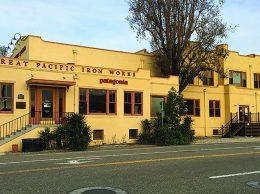Who will lead the tri-county corporate scene over the next decade?
 The ranks of corporate leadership in the Tri-Counties are undergoing a bit of a shakeup.
The ranks of corporate leadership in the Tri-Counties are undergoing a bit of a shakeup.
Our middle class of public companies, including a number of banks, is gradually fading. In some cases that’s through acquisitions, but it is also because companies are going private through management buyouts with private equity partners.
Replacing those middle-class firms are a mix of startups and technology companies, which often are not as big or community-focused as the larger companies being sold. From San Luis Obispo to East Ventura County, the region boasts a number of vibrant smaller companies that are still private, still growing fast and poised to be the next generation of corporate leaders. But, to paraphrase my grandkids, they are not there —yet.
The shifting of corporate leadership to smaller and nimbler growth companies has broad ramifications for philanthropy, the arts, culture and even housing. Philanthropy is likely to be driven more by entrepreneurs and their passion than by workers putting a small part of each paycheck into a worthy cause.
Employees are likely to play a bigger role in steering volunteer efforts and promoting cultural activities. Companies such as Patagonia, Deckers Outdoor Corp. and Montecito Bank & Trust are pioneering employee driven philanthropy as a way to motivate and retain workers, who increasingly will want to ditch long commutes and live closer to the workplace.
I offer these observations as the Business Times publishes the 2012 version of 101 One Hundred, our annual special report on the largest public and private companies in the region. Most notably, our public company-list, once loaded with community banks, has shrunk significantly in the last few years — from 50 to 35 — thanks in part to bank mergers and acquisitions.
Two other good examples of the M&A trend, both based in Carpinteria, come to mind. First, CKE Restaurants, the parent of the Carl’s Jr. and Hardee’s fast-food chains, used to be one of my favorite stocks to follow. It was an excellent proxy for consumer tastes and for marketing trends and also a bellwether for gauging the health of the California economy. CKE has been taken private, and while it still does release quarterly financial data, its stock is no longer traded independently from its parent, Apollo Management.
Second is Clipper Windpower, maker of some of the largest wind turbines in the world and at the leading edge of the region’s clean technology sector. Clipper went from a startup to a private company to a public company very quickly, listing on one of the emerging-company markets in Europe. Although its revenue skyrocketed, the wind energy business is not risk-free. Turbines are hard to sell without lengthy warrantees, and U.S. subsidies are very fickle. Clipper was sold to United Technologies in stages but even that vaunted engineering conglomerate couldn’t find a way to win in the wind industry. Clipper is now up for sale again.
The region continues to add to its public company ranks, with the current growth wave focused on East Ventura County. Ryland Group, a major homebuilder, entered our orbit when it moved its headquarters from Los Angeles County to Westlake Village last year. That move has given us a window on the residential construction industry. Ceres, a Thousand Oaks maker of agricultural products that can be converted into ethanol, is a terrific case study in the future. It went public in late February after a long delay and its prospects are still far from clear. It represents one of those early-stage companies that might succeed spectacularly and really put the region on the map.
Among private companies, we’ve seen Affinity Group, once a major media and financial services company, put its Ventura headquarters up for sale and leave the area. But we’ve also seen Mission Produce and Jordano’s, two long-standing private companies in our region, remain stable, making money in traditional industries such as agribusiness or food and beverage distribution.
One thing for sure about our current corporate lineup is that, with one notable exception, South Santa Barbara County has lost some of its cache for hosting larger corporations, public or private. The exception is Deckers
Outdoor, the Ugg-Teva-Simple footwear juggernaut that is building global brands and a new headquarters in Goleta. But several other mid-sized companies in technology or medical devices have been sold to corporate giants.
The current lineup of companies in the South Coast, in Ventura County and in the Central Coast includes a number in the 100 to 250 employment class that are still fast growing and worth keeping a close eye on. From these companies will come the future corporate leaders for the entire region.
• Contact Editor Henry Dubroff at [email protected].











